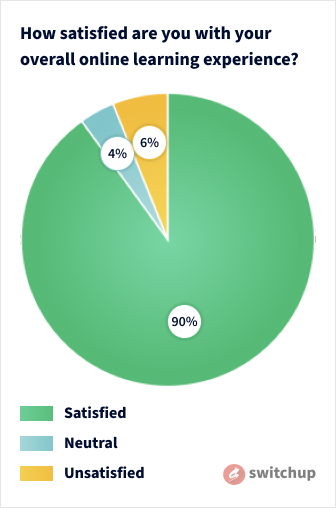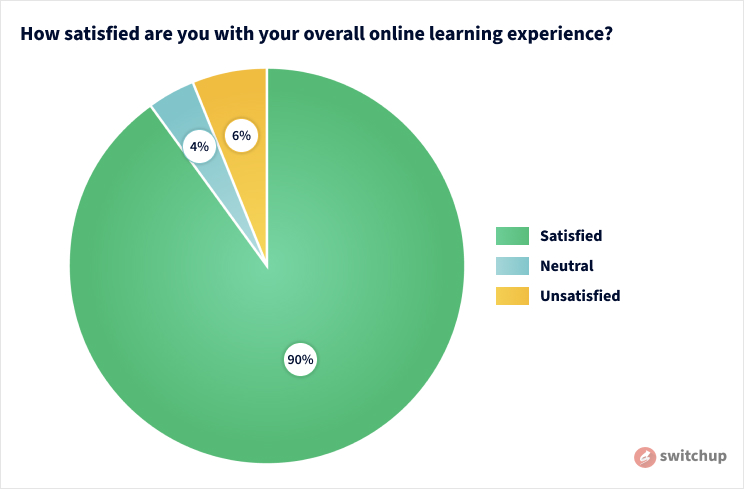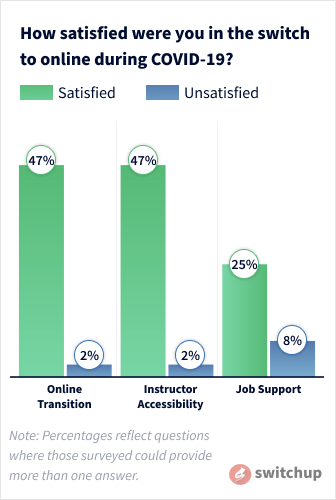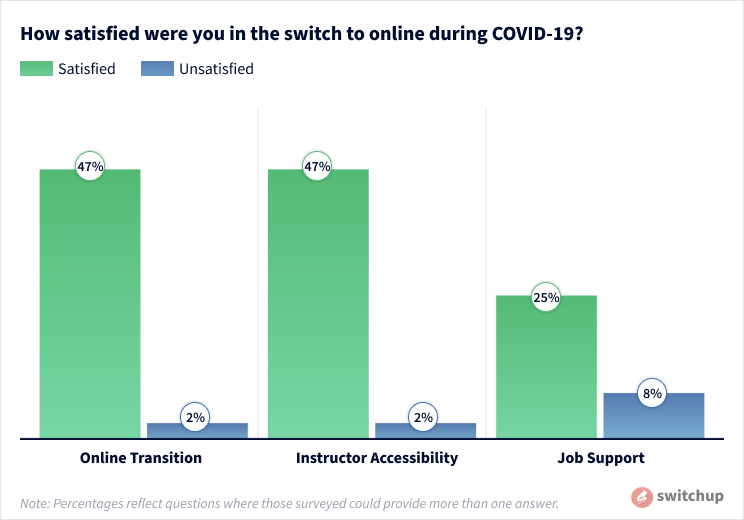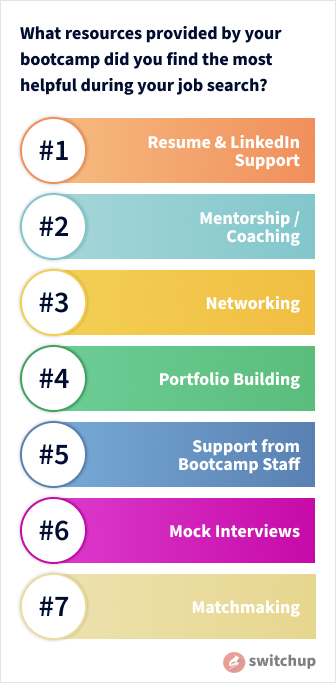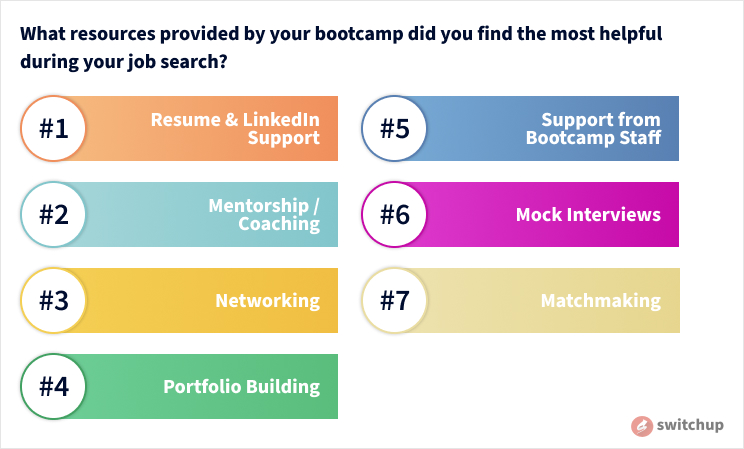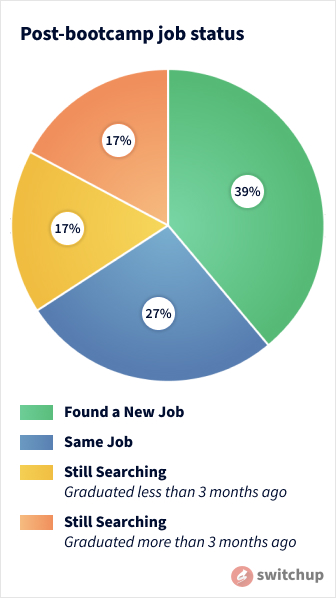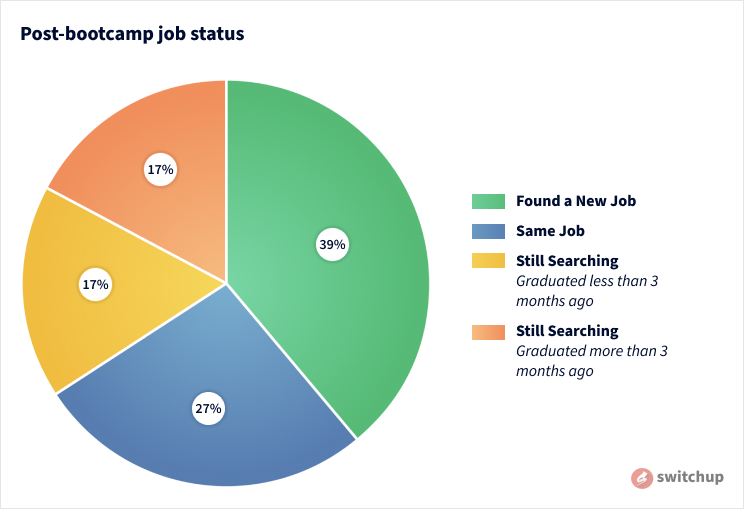Looking to Upskill During the Pandemic? Here’s What Bootcamp Grads Have to Say on COVID-19 Experience
Data shows 9 in 10 students were happy with programs in switch to online
By: Taylor NicholsKey Insights
- Remote tools and instructor support were key factors in smooth transition
- Pandemic graduates report 39% were hired after their program, while 27% stayed at their current job
- Networking and career services are helping alumni enter the field
After eight years working in customer service and medical administration, Danielle Demke was ready for something new.
She had always been interested in tech, and in February 2020, she decided to take the plunge, enrolling in a software development bootcamp. Less than two months later, COVID-19 shutdowns forced her program online.
“I was very nervous, especially with the job market. I knew things were gonna be more challenging than when I originally signed up,” Demke said. “I went into devCodeCamp with zero coding experience, and three months after graduation, I received my first job offer.”
Demke is one of many bootcamp graduates who used an immersive, hands-on program to break into the industry. Her hard work paid off when she landed an entry-level tech position at GalaxE.Solutions after finishing her program.
In recent years, bootcamps have become a popular option to pivot into tech, and it’s clear why. Students learn high-demand skills they need for a position in the industry – and most programs last 12 weeks, on average. They’re often more affordable than four-year degree programs, and provide job support to help graduates enter a lucrative field.
Massive job cuts and months of downtime have many people thinking about going back to school or changing careers. For those interested in tech, top-rated coding bootcamps can be their ticket in.
However, the changing economy and concerns about online learning have many people wondering the same thing: are bootcamps still worth it during COVID-19?
To answer this, the SwitchUp team looked at 276 pandemic-related reviews on our site and surveyed 137 current students and recent graduates. We wanted to find out how bootcamps handled the transition, and what the job hunt is like for graduates right now.
We found that 90% of respondents were satisfied with their online experience during the pandemic. Students cited supportive instructors, career services, and a strong sense of community in their cohort as top reasons for program satisfaction.
The investment has paid off for many recent graduates, and those still on the job hunt are optimistic about the future. Alumni said they learned practical skills that will advance their career despite setbacks due to COVID-19.
How did bootcamps adapt to the pandemic?
The move to online learning left many students feeling unsatisfied, but our data shows bootcamp students weren’t among them. Even though instructors had to make the switch in a matter of days, most recent graduates were satisfied with how programs adapted.
Because bootcamps already operate in the tech world, they were uniquely positioned to respond when states issued stay-at-home orders in March. While other higher education institutions struggled to get up to speed, coding programs already had remote tools such as Slack built into curriculums.
Some said aspects of their online experience were better than in-person classes. Alchemy Code Lab graduate Jenna Goldman, who finished her program in June, said staff made a conscious effort to listen to students and incorporate feedback through the transition.
“I was pleasantly surprised at how naturally the staff, instructors, and our teaching assistants just kind of adapted to it,” she said. “It was actually easier to get help from them more quickly. Everyone's just being a little bit more intentional with their time.”
Of the students we surveyed, 55% had to make the switch to online due to COVID-19, and 45% completed their entire bootcamp online.
Programs used Zoom, Slack, and digital learning platforms to deliver course content and create open channels of communication. Students said having these tools made it easy to connect with classmates and reach out to instructors.
“I actually ended up gaining so much more knowledge of remote programming tools than I otherwise would have,” Roosa Päivänsalo wrote in her review of Scotland-based digital skills academy CodeClan.
Most students were happy with the transition, with only 7% of respondents reporting they were unsatisfied with curriculums, instructors, or the overall quality of their remote program.
“Instructors ensured that our transition to an online learning environment was as smooth as possible, and they did an incredible job.”
Although not all students were accommodated financially, some bootcamps provided refunds, offered gift cards, or changed payment schedules to offer extra support during the transition.
“Le Wagon Milan did a great job in keeping up its standards as much as they could, however it was not necessarily the experience we signed up for,” Le Wagon graduate Stephanie Dinu said. “We, however, did get a chance to redo the camp at any time in the future for no additional cost.”
Instructor support essential in shift to remote learning
While many reviews acknowledged difficulties with moving online, they said instructors made sure students had the resources they needed to adjust. SwitchUp survey results showed 88% of students were satisfied with instructors in the shift to online.
“Our instructors really cared for us, and they wanted us to succeed as developers in the long run,” said LearningFuze alumni Kevin Tolentino, who recently accepted a position as a web developer. “So I think just their want for us to succeed, even in a remote time like COVID, was the leading factor in giving us a smooth transition.”
Other reviews mentioned that staff and faculty were attentive, applied feedback quickly, and were available for students.
“Instructors ensured that our transition to an online learning environment was as smooth as possible, and they did an incredible job,” CodeClan alumni Roosa Päivänsalo said.
When his accelerated web development bootcamp went online about halfway into the program, Tolentino said staff had a clear game plan for moving forward. His cohort’s positive attitude, coupled with instructors’ efforts to boost morale, helped ease the transition.
“Everyone was on board, instructors and students, and we tried to make an effort so that things would go smoothly,” he said. “No one complained. No one was being a stickler about it.”
Program mentors keep students on track in COVID-19 job search
Many coding bootcamps support students in their job search, a benefit that often makes it worth the cost. These services can include placement through industry partners, networking opportunities, and even job guarantees.
Students gave their bootcamps an average score of 4.36 out of 5 for career services, citing coaches and interview preparation as key resources in the job hunt.
“The hard part of networking, interviewing, and studying for a new job doesn't go away, but NYC Data Science Academy gave me the tools and the job support to feel confident that I can do it,” NYC Data Science Academy graduate Sunny Lee wrote.
Alumni are still finding positions despite hiring freezes and other new industry challenges. Our survey results show 29% of students found jobs within four months after graduating, although the length of time it takes to find a job depends on factors such as location, unemployment rates, and how active people are in their search.
LearningFuze Career Services Director TJ Kinion said 2019 graduates took an average of two and a half months to find jobs after they started looking, but the length of time depends on how engaged people are in the process.
“We have some students that find jobs within days or even weeks of graduating,” he said. “Others that do less networking, aren't as aggressive in their application process, and don't practice interviewing as much tend to take closer to five months to land a role.”
Nearly half of the reviews left by students during COVID-19 mentioned quality job support as a reason for their satisfaction with the program.
While many students were satisfied with the job support they received, some students said their bootcamps did not adequately adapt services, tightening rules for job offer guarantees and canceling networking events.
Reviewers said instructors were upfront about the current hiring landscape. Despite rapid changes in the industry, students felt confident in their new skills, even if they hadn’t gotten jobs yet.
“The hard part of networking, interviewing, and studying for a new job doesn't go away, but NYC Data Science Academy gave me the tools and the job support to feel confident that I can do it."
For Jenny Kreiger, the career services offered by Flatiron School made the program worth the cost.
“My coach was amazing, especially at keeping me motivated when the pandemic brought my job search to a screeching halt," she wrote in her review. She has since accepted a position as a data scientist at Shopify.
Many career advisors in tech emphasize the importance of networking in tech. Faculty guide students through bolstering resumes and connecting with industry professionals.
This aspect is what ultimately leads to a job for many graduates, and virtual networking has become even more critical as a result of the pandemic, TJ Kinion of LearningFuze said,
“The only thing that has shifted is it requires a bit more activity from the student side,” Kinion said. “You’re having to fall into a little bit more networking through LinkedIn.”
Bootcamp staff often have connections in the industry and personally recommend students for open positions. That’s how Alchemy Code Lab alumni Jenna Goldman found her job as a software engineer one month after graduating this summer.
“That was enough to get my foot in the door to actually do the interviewing, so I owe this role in part to her,” Goldman said of her career services director, who recommended her for the position. “I definitely recognize that I'm the one who got through the interview and proved that I could do the job, but she made it possible to make that happen.”
Bootcamp grads are still finding jobs in struggling economy
The COVID-19 recession has rippled through every field, and tech has not been spared. Although the pandemic has caused abrupt changes in the industry, many students have still been able to find jobs within months of graduating, and some secured positions before they finished their program.
Survey data from SwitchUp shows 39% of students were hired after their bootcamp, while 27% remained at the same job they had before enrolling.
“Since summer is kind of wrapping up, we've seen hiring pick up,” Kinion said. “People are still finding jobs; it just takes a little bit more momentum and activity [from students].”
As of early September, 34% of those surveyed were still searching for jobs, and half of those still looking had graduated within the last three months.
Early on in the pandemic, many companies put a hold on hiring until they could get employees working from home and adjust processes for hiring remotely, Kinion said.
“All of their forecasts are showing it’s gonna bounce back,” Kinion said. “I think the big factor is companies figuring out how to do more of their hiring virtually, and then more specifically onboarding, especially when it comes to junior and entry-level talent.”
Bootcamps are an excellent choice for people looking to upskill or change positions within the tech industry, but they can also help prospective students looking to change career paths break into the field.
“I actually ended up gaining so much more knowledge of remote programming tools than I otherwise would have.”
General Assembly bootcamp graduate Samantha Sexton worked in customer service and medical administrative roles, but she knew she needed to advance her career when she became a single mother. She decided to transition into software engineering and enrolled in a bootcamp.
“This really legitimately changed my life. I have a job that I really enjoy,” she said. “I was working 60 to 90 hours a week before I had the baby. I almost quintupled my income by doing this program for three months.”
Sexton said she chose to go into software engineering because it allowed her to use her degree in linguistics in a new way, and she wasn’t ready to pursue the master’s degree most linguistics positions require. Sexton was hired as an Associate Software Engineer three months after completing her bootcamp.
Students with little or no programming experience before enrolling said immersive programs, quality curriculums, and instructor support eased the transition into tech.
“Being a woman, being somebody that doesn't have a degree, being somebody that doesn't have any IT background, it's just really cool that it’s possible,” said devCodeCamp graduate Danielle Demke, who recently accepted a position with GalaxE.Solutions. “They're really getting down to teaching you the things you need to know for the job.”
Bootcamps set students up for success in evolving industry
Changes in the industry and fears about online learning may have prospective bootcamp students nervous about enrolling, but students who learn coding from home will be better prepared to enter the new field of tech post-pandemic.
Bootcamps are a uniquely viable option right now. They’ve already adopted new technologies and incorporated them into curriculums. They also teach practical skills employers are looking for and provide job support that relies heavily on networking, a key factor for employment in today’s competitive market.
“What you’re paying for is not just the guidance and mentorship and keeping you on track, but the career services you’re gonna need to help find a job afterward,” TJ Kinion of LearningFuze said.
The pandemic has forced society to rely more heavily on technology than ever before and will push advances in the industry. Recent analysis from nonprofit tech association CompTIA shows companies in the industry are starting to hire, and Glassdoor’s Job Market Report for August shows jobs in tech are up 13.4% since July. As the U.S. economy begins to recover, bootcamp students will be graduating with up-to-date skills in high demand.
Our rapid integration of technology in communication, business, retail, and many other sectors will also fuel new opportunities and emerging needs, making coding bootcamps a good choice for those seeking positions in a growing industry.

